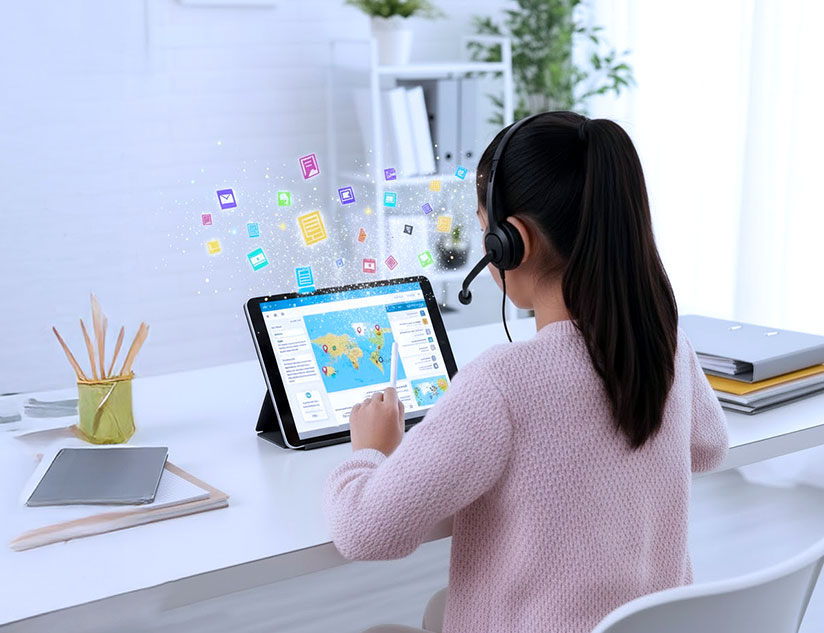UNESCO acknowledges that no technology can replace human teachers. Simultaneously, the organization “advocates for leveraging digital innovation to expand access to educational opportunities, enhance quality learning, and build inclusive and resilient learning systems.” This is because, in addition to supporting students with poor access to quality education, digital learning platforms support teachers in augmenting classroom learning with cutting-edge tools. However, the satisfaction levels among parents of children receiving online-only and hybrid K-12 academic instruction remain significantly lower than that of parents of students who learn in traditional classrooms.
Parents who have experienced traditional classrooms only cannot understand the comprehensive benefits and usage of online learning tools without experiencing them first-hand. This is where educational institutions must intervene and help foster a positive mindset toward the changing educational landscape. The beginning of the new academic year is the perfect opportunity to bring parents, together with their children, back to school and educate them about the advantages of digital learning platforms. This is also an opportunity to encourage them to embrace digital educational technology.
Parental Involvement: A Valuable Component in K-12 Education
Do you remember the times when community days and game nights with parents used to be common in traditional classroom set-ups at least once a year? This is because parental involvement in learning is crucial to student success. A strong relationship between parents and teachers fosters a conducive environment for students to thrive emotionally, socially, and academically. Moreover, the active participation of parents in their children’s education, especially in the increasingly digitized ecosystem, builds a continuum of learning between the school and home.
Here’s why bringing parents back to school via online learning platforms is essential:
Parents as Co-Teachers
In digital education, parents play the crucial role of ParaTeachers. They guide students through the learning journey at home. Research proves that the involvement of parents positively impacts students’ learning experience and academic achievement. Encouraging parents to embrace online learning tools can drive them to provide students with a suitable digital learning environment at home.
Reinforced Focus on Student Success
Strong home-to-school partnerships help parents and teachers comprehensively gauge students’ learning needs and preferences. Analytical tools of digital learning platforms provide comprehensive reports on learners’ strengths and weaknesses. Combined insights help educators develop personalized strategies and administer targeted interventions to facilitate academic success.
Back to School Together: Strategies to Improve Parent-Teacher Collaboration
About 33% of parents feel they are not well-informed about their child’s learning progress due to the lack of communication from the school. This is primarily because widespread grade inflation creates a (false) sense of security among parents, while they increasingly grow distant from students’ learning realities due to busy schedules. Digital learning platforms, armed with a custom parent portal, encourage parents to be deeply involved in their child’s learning with the following features:
- The most notable benefit of online learning platforms is that the need to physically travel to interact with teachers face-to-face is eliminated. Parents can access students’ information, teachers’ feedback, and assessment updates, as well as interact with others through the parent portal, at any time and from anywhere.
- Dedicated parent dashboards allow the tracking of learners’ progress and learn about their kids’ strengths and weaknesses. This helps build transparency between parents and the educational institution.
- Discussion forums to interact with other parents in the community and messaging tools to share their concerns directly with the teachers reassures parents of being involved and builds confidence in the evolving learning landscape.
- Shared access to learning resources allows parents to actively guide their children, gauge the extensiveness of educational materials, and even provide feedback. K-12 publishers can use this feedback and collaborate with teachers to refine digital learning resources.
Educational institutions can conduct community drives to introduce parents to the facilities of digital learning platforms and encourage participation by conducting interaction sessions from time to time. Enhancing digital literacy and building a positive attitude toward digital education technology is crucial to fostering effective parent-teacher relationships.
Strive for an Exceptional Home-School Alliance with digital learning platforms
Remote and hybrid education rely on more knowledgeable others (MKOs) at the student’s place of learning. This makes parents the co-teachers. As K-12 learners get ready to go back to school every year, parent education about the ways to support their journey can be instrumental in driving student success. The key to leveraging educational technology is to optimize digital learning experiences. Simultaneously, helping parents adapt to the shift in learning culture fosters learner success. Educational institutions must drive continuous and transparent communication while encouraging parents to leverage digital learning platforms. There also is a pressing need to inform parents about managing screen time and encouraging self-driven learning.
An online learning platform designed for student success supports deep parental involvement and teacher support to improve learning outcomes. Learn how MagicBox™ equips educational institutions, publishers and edtechs to integrate educational and collaboration tools to enhance home-school relationships and learner outcomes.









